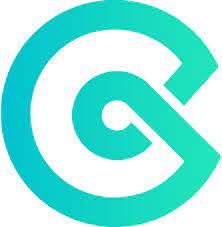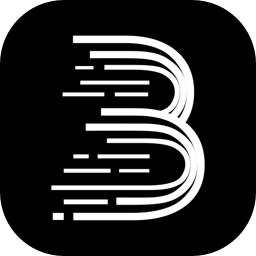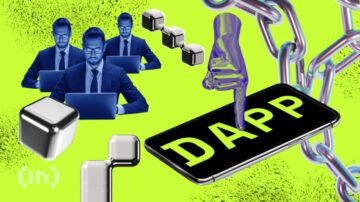Railgun isn’t your regular privacy tool or mixer. The DeFi project is built on Ethereum and allows users to indulge in swaps, send across funds, and interact with other DeFi projects — pools, DEXs, and more — without revealing key details. In fact, the Railgun network adheres completely to the ethos of blockchain privacy using smart contracts, a relatively new privacy-preserving technology, and a governance model.
From crypto degens looking to protect alpha-making strategies from prying eyes to businesses looking to avert the interest of scammers, Railgun’s use cases are diverse and plenty. This guide delves into how each element of the network works and considers what makes it one of the newest and most innovative privacy tools in crypto.
Methodology
BeIncrypto tested the best exchanges to buy RAIL over a six-month period. Here’s a quick insight into why each was highlighted.
CoinEx
• Large trading volumes
• Wide crypto and token availability
• Around-the-clock customer support
• Low fees for VIP users
• KYC is not mandatory for new users
Bitmart
• Users can earn crypto
• Offers a simple buy/sell crypto option
• Low trading and withdrawal fees
• Payment methods are diverse: Credit & debit cards, PayPal and even bank transfer
• Great for beginners
For additional info on BeInCrypto’s methodology and verification practices, follow this link.
- Unpacking Railgun
- How does Railgun maintain user anonymity?
- How does Railgun work?
- Railgun features
- Understanding the native token: RAIL
- CoinEx
- BitMart
- How does the network manage governance?
- Railgun vs. other privacy tools
- Is Railgun the future of anonymous blockchain transactions?
- Frequently asked questions
Unpacking Railgun
Railgun, like any other privacy tool in crypto, is a system through which you can route your cryptocurrencies to remain anonymous. By choosing Railgun, you can keep your personal identity and financial activity concealed. Even though the transaction is recorded and validated on-chain — Ethereum in this case — specifics like recipient, sender, and transaction content are obscured.
“Privacy is normal.
Railgun uses the privacy pools protocol which makes it much harder for bad actors to join the pool without compromising users’ privacy.”
Vitalik Buterin, co-founder of Ethereum: X
Underlying technology
Railgun uses zero-knowledge proofs (ZKPs) as its integrated privacy-preserving technology. The specific form of ZKPs is zk-SNARKs, which allows transaction details to be concealed while conforming to the rules of the network.
There is a basic smart contract setup that interacts with zk-SNARKs — the choice of cryptographic method for the Railgun network. Once integrated to confirm the validity of the transactions without revealing key details, the tokens are moved in any supported or desired way anonymously. With Railgun, we see a new level of privacy for DeFi applications, helping devs prepare DApps in stealth mode.
Origin and development
This project was in the works for a number of years, finally coming to fruition in 2021. Railgun quickly positioned itself as one of the go-to privacy-specific ecosystems within the Ethereum ecosytem. As far as the development cycle is concerned, Railgun is primarily a community-driven gig spearheaded by privacy advocates and blockchain developers.
Railgun’s growth:
Did you know? Even though Railgun is an Ethereum-based EVM-compatible DeFi project, it plans to extend its reach to other networks over time.
How does Railgun maintain user anonymity?
When it comes to the concept of user anonymity, Railgun uses advanced cryptographic strategies, helping identities remain shrouded when interacting with DeFi applications. Here are the several ways in which anonymity is preserved.
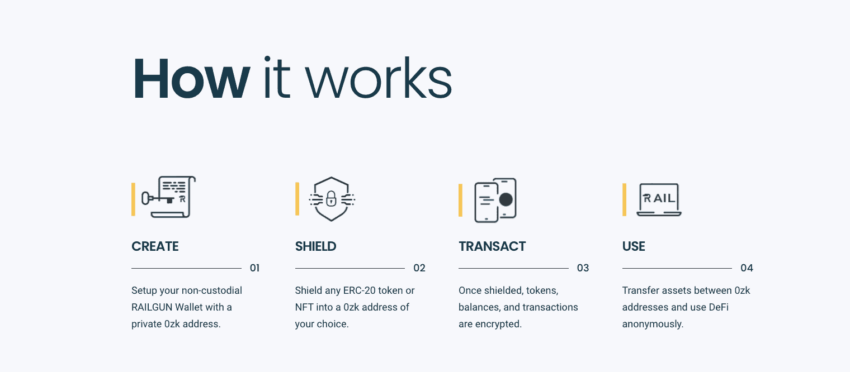
Shielding transactions
Railgun network allows you to shield every ERC-20 token that you hold using the privacy-preserving technology. These shielded tokens can then be used to initiate shielded transactions, like yield farming interactions, swaps, or any other DeFi-specific tasks.
Here is a (significantly simplified) run-through of how it works:
Once you deposit tokens into the network, you get a new private balance associated with a pseudonymous address. This address has no link to the original wallet of the user. Users can rely on this shielded balance to interact with the DeFi products. Meanwhile, the external observers can only see that a Railgun contract interacted with a DeFi protocol.
Even Vitalik Buterin has been interacting with the smart contracts, and on April 15, 2024, sent across 100 ETH in a shielded transaction narrative:
The news of this transaction not only set the RAIL token alight (its value increased more than 120% in a matter of hours as per CoinMarketCap price data) but also led to substantial online discourse around Buterin’s use of the privacy tool.

Quick and private transfers
Even though the tokens are shielded, transactions could still be public if someone tracks the inflow and outflow of funds. The Railgun network allows the private transfer of these shielded tokens, provided the user has a zk-SNARK proof ready. This way, even the amount transferred is obscured, and the zK-SNARK-based proof alone is sufficient to validate the legitimacy.
Interaction with DeFi protocols
Railgun has relayers that allow the shielded tokens to be used across decentralized exchanges and for swaps. This allows experienced degens to use the Railgun network to hide their DeFi interactions.
Implementation of zero-knowledge proofs
All the anonymity-preserving methods mentioned previously use zero-knowledge proofs (ZKPs) as the privacy-preserving technology. Railgun uses zk-SNARKs, one form of ZKPs, to prove a scenario is correct without revealing further information. These SNARKs are succinct, take almost no space, and are super quick.
When it comes to the implementation, here’s how it works for regular users looking to onboard on the Railgun network. Once the user deposits tokens to the network contract, a zk-SNARK-based proof is generated. This automatically certifies the deposit without linking anything back to the user’s address. For every transaction from this point, zk-SNARK proofs are created and validated by the concerned smart contracts. ZKPs are highly secure as the mathematical properties discourage efforts to derive any info from the inputs.
DeFi applications
Like other privacy tools in crypto, Railgun supports private token transactions. However, its USP is the ability to support anonymous DeFi transactions, which include interaction with:
- Decentralized exchanges without revealing transaction histories
- Staking and yield farming participation without exposing patterns and holdings
- Indulge in DeFi governance via private voting
How does Railgun work?
Now that we’ve covered the basics of this EVM-compatible protocol let’s jump right to the modus operandi. As a privacy-focused DeFi system, this network uses a combination of smart contracts, ZKPs, and relayers (a network) to maintain security, privacy, and integrity. The process can be broken down into multiple steps:
Initial setup
The process starts when ERC-20 tokens are deposited into the Railgun smart contract. The initial deposits are recorded, but even if an address is being followed, it will only show that your wallet interacted with a Railgun contract.
Shielding
Upon deposit, the smart contracts shield the tokens. This means they are moved to a Railgun-specific pseudonymous address, which isn’t linked to the user’s Ethereum address.
Proof-generation
Any transaction attempted using these tokens generates a zero-knowledge proof, which is instantly verified, providing the foundation for this blockchain privacy tool.
Relayers come in
Railgun employs a network of relayers to enhance privacy further. These relayers broadcast transactions onto the Ethereum blockchain on behalf of the users. It is the relayer that receives the zk-SNARK proof to proceed further. The relayer also waits for the transaction details, fees, and other elements needed to process a transaction.
Privacy is achieved
The concept of ZKPs and relayers ensures that the Railgun network makes way for unlinkable transactions and offers network-wide privacy.
A quick real-world example: Imagine the Railgun network as a private members-only club. This club is intended to provide a secure environment for all the concerned members, without exposing identities to the outer world. Now you can consider the membership card as the token shielding device, the club’s ledger as the zero-knowledge proof, and the club’s concierges as the relayers.
Then there are private VIP rooms, synonymous with private transactions and the concept of club governance that aligns with the Railgun DAO.
Railgun features
Here are some of the key features of the network:
- Non-custodial protocol
- ZKP-powered privacy
- A DAO-based and token-specific governance model
- Relayer network
- Multi-chain compatibility
- Seamless DeFi integration
- Composable and flexible smart contracts
- Multi-wallet compatible
- Integrated SDK allows users to create new wallets
- Auditable open-source code
- Railgun Connect allows direct yet private DApp interactions
Pros and cons
There are clear benefits to using the Railgun network. But how do they stack up against the drawbacks? Let’s take a quick look.
Pros
- Enhanced privacy
- Non-traceable transactions
- Complete user control over funds
- Community-driven approach
- Seamless DeFi interactions
Cons
- It can be complex for new users
- Increased transaction costs
- Potential regulatory challenges
Understanding the native token: RAIL
RAIL, the native ERC-20 token of the Railgun network, can be used as a smart contract-interacting token within this privacy-focused ecosystem. Here’s what to know.
Tokenomics
RAIL tokens come with a capped supply of 100 million, with 50 million introduced as of 2024. As far as the distribution goes, the DAO controls 50%, whereas 25% of the tokens are with the Railgun foundation, and the remaining 25% moved via airdrops to Ethereum addresses that previously interacted with privacy-focussed non-profits like TOR.
Use-cases of RAIL
The native token can be useful for the following:
- Network governance, allowing holders to wield influence
- Staking and rewards
- Fee payments and incentives directed towards the relayers
Best platforms to buy RAIL
RAIL tokens are relatively new. As such, you can purchase them on UniSwap and SushiSwap, two of the most popular DEXs. As for centralized exchanges, here are our top picks:
CoinEx
• 600+ crypto assets
• Supports leverage trading
• Global reach
• No KYC
BitMart
• 700+ trading pairs
• High RAIL/USDT liquidity
• No KYC
Also, here is a list of all RAIL markets for your reference:
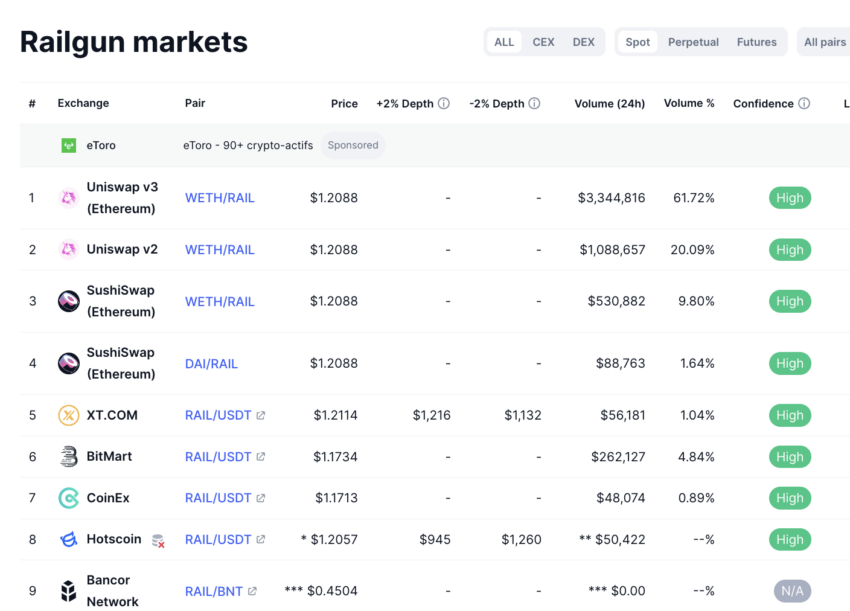
How does the network manage governance?
The network manages the governance model via a DAO, with RAIL tokens playing a critical role. The DAO-powered governance model allows RAIL holders to participate actively in shaping the ecosystem’s operational strategies. Here are some of the key elements in play:
- Staking for voting is used to keep the network secure
- Token holders can submit community proposals based on the volume of RAIL holdings or staked RAIL
- A wide range of proposals can be submitted
- The voting process is transparent and recorded on the blockchain.
- For a valid vote, Railgun awaits a majority decision
- Approved calls are executed by the developers
- Decision implementation is monitored
- The protocol has built-in measures against malicious proposals
Railgun vs. other privacy tools
Railgun isn’t the only privacy-focused tool in town. Others include Bitcoin tumblers, which are mixers offering anonymity via BTC redistribution and pooling. However, most of these options only offer moderate privacy as they rely mostly on fund shuffling. Railgun, in comparison, guarantees high privacy, all thanks to the enhanced, mathematically-powered zero-knowledge proofs.
Other privacy solutions include the controversial Tornado Cash, which focuses on breaking transaction traceability using smart contracts. Even though Tornado Cash offers the highest possible level of privacy, Railgun extends beyond its simple transfers as it is usable across decentralized finance (DeFi) applications.
Is Railgun the future of anonymous blockchain transactions?
Railgun has what it takes to become a formidable addition to the blockchain privacy space, led by its use-case-specific RAIL token. However, long-term success will depend on how well it can navigate the regulatory and scalability challenges that characterize decentralized ecosystems. If you’re looking to invest in RAIL, ensure to prioritize security. Only do so with a comprehensive risk management strategy in place and ensure that you do not succumb to FOMO.
Frequently asked questions
What are the benefits of using Railgun over other privacy networks?
How can I start using Railgun network?
What is the Railgun Ethereum contract?
Trusted
Disclaimer
In line with the Trust Project guidelines, the educational content on this website is offered in good faith and for general information purposes only. BeInCrypto prioritizes providing high-quality information, taking the time to research and create informative content for readers. While partners may reward the company with commissions for placements in articles, these commissions do not influence the unbiased, honest, and helpful content creation process. Any action taken by the reader based on this information is strictly at their own risk. Please note that our Terms and Conditions, Privacy Policy, and Disclaimers have been updated.



